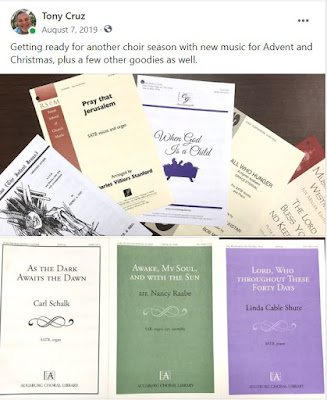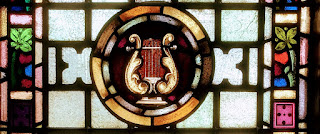When I was growing up, people often referred to their daily quiet time with God as “devotions.” I always loved that word. It described a holy time in the day – not a time for Bible study or theological reading, but a time for simply being in the presence of God and meditating on the written word.
Much later I discovered the services of Daily Prayer. First, as an Episcopalian, I found the service of Evensong – often expressed in the church with chanting, hymns, and the sublime music of a carefully rehearsed choir. (Even today, I often call myself a Lutheran with an Episcopalian aesthetic.)
Later,
I used the forms in the Book of Common Prayer, for my own devotional time. I learned
that Daily Prayer has been part of our
Christian heritage for some time – closely tied to the ancient monastic
practice of praying at certain hours of the day.
I am so happy to have had the opportunity to provide Daily Prayer services on
YouTube during this season of “Covidtide.” – not an official season of the
church year, but one that provides some unique opportunities.
I
hope that people will use these services in their homes. Using this resource
will also help you to become familiar with these services as presented in Evangelical
Lutheran Worship.
Both
services include a reading that is updated for a specific day. If you wish to
use a different reading, simply pause the video and fast forward. Check the
comments for readings that may be used on subsequent days. Both services also
allow you to include your own petitions during the prayers. If you need more
time, feel free to pause the video. Also, everything you need (music and texts)
is included.
Here is more of what to expect:
Morning Prayer (usually less than 15 minutes)
An opening dialog begins the service.
A
setting of Psalm 95:1-7, also called the Venite. Start by learning
the refrain, then sing the entire psalm.
The
reading comes from a lectionary that complements the Sunday lectionary
and can be found in Evangelical Lutheran Worship.
The
Gospel Canticle is set with an assembly refrain and stanzas sung by a
cantor.
The Prayers include thanksgiving and intercessions, followed by the Lord’s
Prayer.
Evening Prayer (a little over 20 minutes)
An opening dialog begins the service.
A
Hymn of Light is sung. Music and text are provided onscreen. For now, we
are using “Christ, Mighty Savior” – a modern tune with an ancient Mozarabic
text from the 10th century. The people who first sang it were
Christians living on the Muslim-controlled Iberian Peninsula.
The Thanksgiving for Light recalls the creation (“Let there be light!”) and
God leading Israel through the wilderness – by a pillar light!
The Evening Psalm has an assembly refrain with stanzas sung by a cantor.
The Word (readings) is the gospel reading from the daily lectionary in
the Book of Common Prayer.
The Gospel Canticle is a metrical setting of Mary’s Magnificat set
toa joyful Lutheran choral tune. We usually sing “In Thee is Gladness” with
this tune.
The Prayers follow. They include the current list of prayers from the
people of St. Mark’s as available at the time of recording. It also includes the
Lord’s Prayer.
A
blessing concludes the service.
Additional Notes
I
like to prepare for Morning Prayer with a tall glass of cold water. It helps me
to remember my baptism and makes me thankful for God’s nurture of all creation.
Since a candle is often lighted for Evening Prayer, you may want to light one
at home.
Both services can be used by individuals or small groups.
Look for these services on our YouTube channel at www.youtube.com/c/StMarksJAX/videos
May God hold you close as you use these services, and may peace be with you.


































